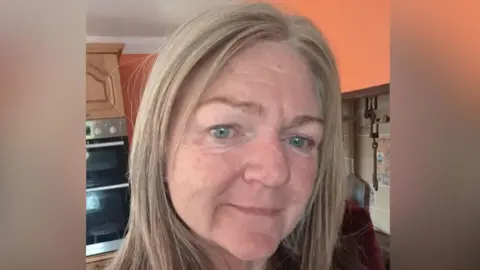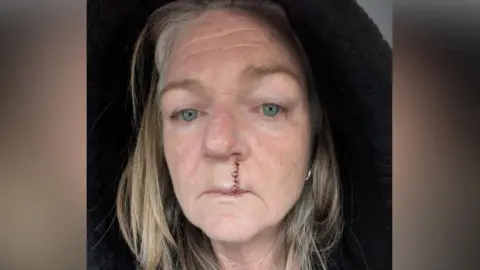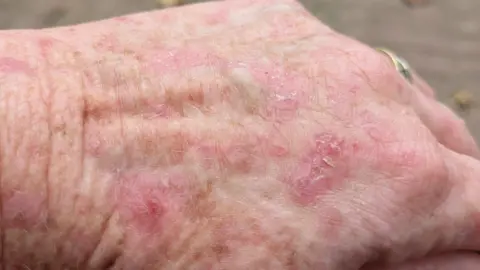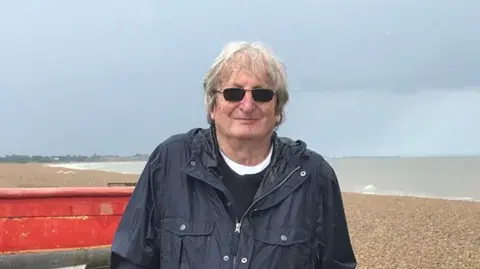'The sun is lethal - it caused my face tumour'
 Contributed
ContributedGrowing up in Africa, Nicola Smart enjoyed countless hours surfboarding and lifeguarding under the intense sunshine.
Unfortunately, the exposure to the sun would later lead her to a skin cancer diagnosis.
While it was a non-life-threatening type, Mrs Smart, now 54, and living in Copdock near Ipswich, has undergone years of cryotherapy treatment, biopsies and body maps to ensure the cancer does not spread.
In recent months, doctors found a tumour just above her lip after she noticed a dry sore, and it was removed.
Mrs Smart is encouraging everyone to be careful in the sun for May's skin cancer awareness month.
"Living the African life, I was a lifeguard, I was a surfer, I was a boogieboarder, I did the whole lot," Mrs Smart explained. "I got burnt loads."
Mrs Smart was diagnosed with non-melanoma skin cancer - a common type of cancer that starts in the top layer of skin.
The main types of this cancer are basal cell carcinoma and squamous cell carcinoma, both of which Mrs Smart has had.
"I have been having cryotherapy on my hands, arms and face for the last 10 to 15 years," she continued.
"Being then put under dermatology in the last four years, I've had to have more biopsies.
"So I've been cut left, right and centre on my arms and hands, and the most recent one has been my face, which is the one that really got me."
 Contributed
ContributedA few months ago, Mrs Smart noticed "a little sore" between her nose and top lip, which she thought was dry skin.
However, a biopsy was done and a tumour was found.
Mrs Smart said she was "devastated" by the news and underwent surgery to remove the tumour as well as plastic surgery.
"I'm not a proud person or pretty-faced and bothered, but it's my face, and my face is my job as well - I'm a companion for the elderly," she added.
"It really worried me that I'm going to be disfigured."
 Contributed
ContributedMrs Smart was last week given the all clear, which she said was a huge relief.
"I want everybody out there, [to use] factor 50, cover yourself, wear a hat and don't care what you look like, take care of your skin," she said.
"The sun is lethal. You don't need to be tanned to be beautiful either, so what if you're pale?"
 Contributed
ContributedAndrew Lines, 70, from Beccles, Suffolk, was similarly diagnosed with non-melanoma skin cancer.
It all stemmed when he was born with kidney problems, and at the age of 24, he had a transplant from his brother.
He was warned by doctors he could have skin problems later down the line, as those who receive transplants are often at higher risk of developing skin cancer due to immunosuppressant medication they take to ensure their body does not reject the new organ.
"I was also told after I had the transplant to go out and do all the things I hadn't been able to, and playing cricket was something I really wanted to have a go at," he explained.
"I played 15 summers of cricket with not all that great sun protection.
"I was told that I should [wear protection], but because I didn't have any issues, I didn't."
'Accelerated'
As he got older, Mr Lines said he noticed his skin becoming thinner while lesions developed.
The problem gradually worsened, and then a small lump was found on his head, which was found to be skin cancer.
"It's kind of accelerated in the last three years to the point that I've had four issues this year already," he added.
 Contributed
ContributedMr Lines has had both basal cell carcinoma and squamous cell carcinoma and is currently waiting for the results of a biopsy recently done on his nose.
Sun protection is now hugely important for him, and he always ensures he is wearing sun cream as well as hats.
"More than anything, it's hit my confidence," he continued.
"I love watching cricket, and when the weather is good, I have to think twice about whether I really need to go out because the sun does cause issues with skin cancer."
Mr Lines was keen to stress the importance of getting any skin changes checked by a doctor.
'Unprecedented'
Cancer Support Suffolk, which attended this week's Suffolk Show offering free skin checks, said there was "a huge, unprecedented" amount of skin cancer in the county.
"Statistic wise, the referral rates for suspected skin cancer is going up year-on-year; we're seeing more and more patients each year," a spokesperson said.
Follow Suffolk news on BBC Sounds, Facebook, Instagram and X.
